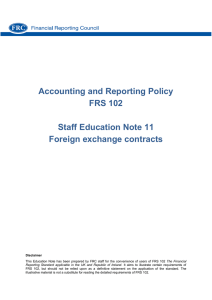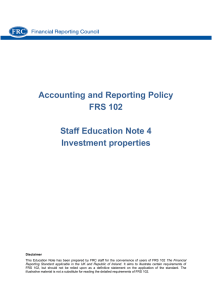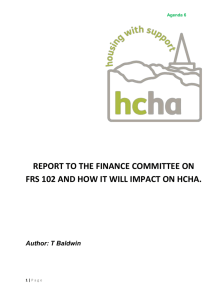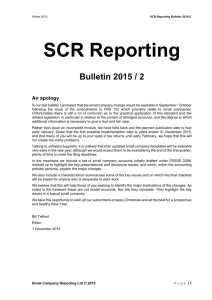Impact of change in accounting standards to FRS 102
advertisement
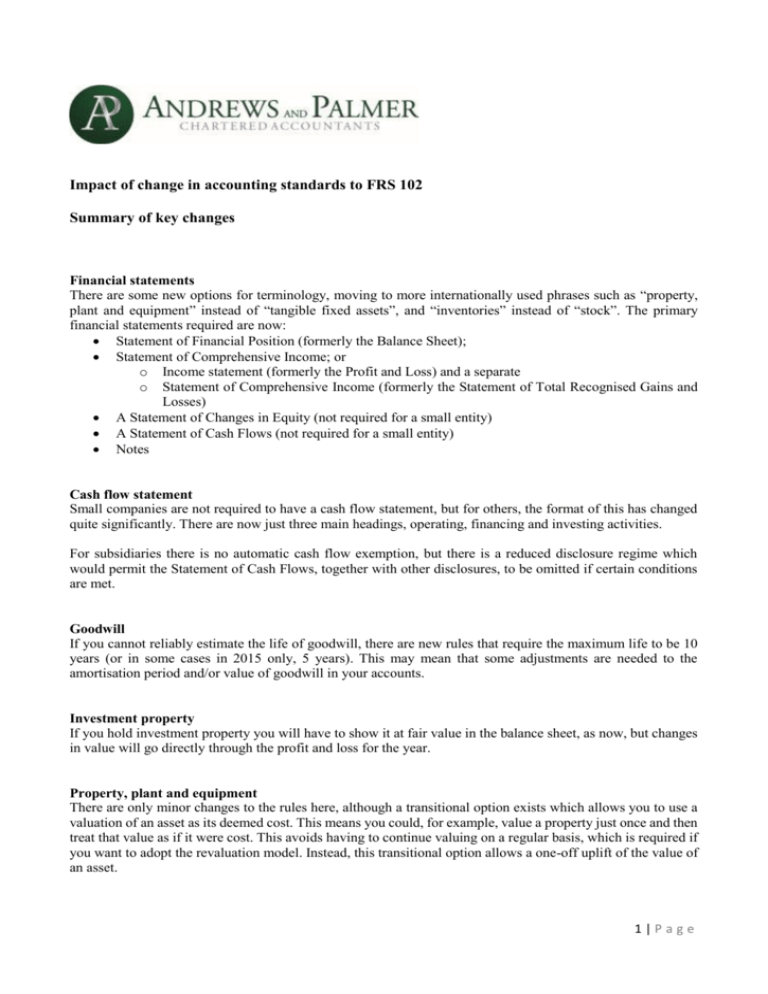
Impact of change in accounting standards to FRS 102 Summary of key changes Financial statements There are some new options for terminology, moving to more internationally used phrases such as “property, plant and equipment” instead of “tangible fixed assets”, and “inventories” instead of “stock”. The primary financial statements required are now: Statement of Financial Position (formerly the Balance Sheet); Statement of Comprehensive Income; or o Income statement (formerly the Profit and Loss) and a separate o Statement of Comprehensive Income (formerly the Statement of Total Recognised Gains and Losses) A Statement of Changes in Equity (not required for a small entity) A Statement of Cash Flows (not required for a small entity) Notes Cash flow statement Small companies are not required to have a cash flow statement, but for others, the format of this has changed quite significantly. There are now just three main headings, operating, financing and investing activities. For subsidiaries there is no automatic cash flow exemption, but there is a reduced disclosure regime which would permit the Statement of Cash Flows, together with other disclosures, to be omitted if certain conditions are met. Goodwill If you cannot reliably estimate the life of goodwill, there are new rules that require the maximum life to be 10 years (or in some cases in 2015 only, 5 years). This may mean that some adjustments are needed to the amortisation period and/or value of goodwill in your accounts. Investment property If you hold investment property you will have to show it at fair value in the balance sheet, as now, but changes in value will go directly through the profit and loss for the year. Property, plant and equipment There are only minor changes to the rules here, although a transitional option exists which allows you to use a valuation of an asset as its deemed cost. This means you could, for example, value a property just once and then treat that value as if it were cost. This avoids having to continue valuing on a regular basis, which is required if you want to adopt the revaluation model. Instead, this transitional option allows a one-off uplift of the value of an asset. 1|Page Lease incentives If you are a lessee or lessor of an asset under an operating lease then any lease incentives, such as rent free periods, will now need to be spread over the whole lease term. Currently they are just spread over the period to the first rent review. The lease term is now defined as the period over which there is reasonable certainty that the lease will continue, even if there is a break clause before that. This can have taxation implications, so you may wish to discuss this with us, as there are various options on transition. Foreign currency translation The rules have changed so that where you have foreign currency transactions you will always need to translate the amounts at the rate ruling on the date of the transaction (the spot rate). In the past, you were able to use the rate of any related forward contract, or a contracted rate if one was agreed. There is a requirement in FRS 102 to establish the functional currency of the entity. Normally this will be pounds sterling for a UK company, but if most of its cash flows are in another currency, or impacted by another currency then this may not be the case. We can discuss the impact of this if you think it might apply. Financial instruments These include a wide range of assets and liabilities which are financial, rather than tangible or intangible in nature. For example, cash, debtors and creditors are all financial instruments. The main changes in respect of these items are that: Investments in shares that are not group companies must be measured at fair value if possible, with any unrealised or realised gains or losses reflected in the profit or loss. Derivatives, which includes items such as a forward currency contract, an interest rate swap, futures or options all need to be recognised in the balance sheet at their fair value with gains or losses in the profit or loss. In the past these were ignored until the contract was completed. The new treatment means that you will need to check if you have any such contracts and obtain a valuation for them, together with the valuation method used. Loans that are not at a market rate need to be put into the accounts as if they are at market rate. This requires the calculation of notional interest at a market rate. (Public benefit entities, such as charities, do not need to do this though). Hedge accounting Because the impact of the changes described for foreign currency and financial instruments can be to increase the volatility in the profit and loss and not to match related transactions, there is the ability to use hedge accounting. This is a complex process but ensures close matching of related contracts, such as a foreign currency purchase and forward foreign exchange contract. Business combinations, associates and joint ventures Acquisitions, or so called business combinations, are usually dealt with in the consolidated accounts if these are required (small groups are not required to prepare consolidated accounts). Under the new rules you are more likely to have to recognise intangible assets, such as customer lists, that you have purchased as part of the acquisition. Previously, these would often have just been part of the goodwill figure. There are also some minor changes regarding associates, joint ventures and the accounting treatment of acquisitions or disposals achieved in stages. Related party transactions There have been some changes to the definitions and to the disclosure requirements, although these are fairly minor, unless you are a small company. Small companies will only need to disclose limited related party transactions and in particular only those which are not at a market rate. 2|Page Deferred tax The rules for this have now been tightened up, meaning that deferred tax is required on some items that were previously exempt. This means that deferred tax will need to be recognised on all revaluations and also sometimes on unremitted earnings from a subsidiary. This will generally mean that your deferred tax figure will be higher than before. Employee benefits The new rules mean that it will be necessary to consider whether you need an accrual for holiday pay, where holiday is due at the year-end but has not been taken. If this amount is material it will need to be calculated each year and put into your accounts. It is usually only material if the holiday year and the accounting year are different, or if you allow staff to carry over significant amounts of holiday into the next year. There have been some changes to the accounting for defined benefit pension schemes, but as these are rare please ask for further information if this affects you. Share-based payments (FRSSE companies) FRSSE companies have been exempt from the requirement to account for equity settled share-based payments. However, under FRS 102 they will now need to be accounted for. For other companies, the requirements for these are essentially the same as under the current rules. Transitional changes The general rule when dealing with the move to FRS 102 is that all the changes are applied retrospectively, through the calculation of what is termed a prior year adjustment. However, as this would sometimes be very onerous there are a number of transitional exemptions, enabling the new rules to be applied only in the future. These do not cover all the changes though, so in the first year there will probably be adjustments made to reserves and disclosures will be needed to explain the impact on the balance sheet and profit and loss. Small companies are not required to give these disclosures although they are likely to be helpful to anyone using the accounts. Practical impacts of the changes There are some areas of your business that could be impacted adversely by the changes in the accounting rules if you do not consider the issues. Broadly speaking they include any contract, covenant or other agreement which is based on or refers to your accounts or specific figures in them. In particular, because the profit can be more volatile and include items such as gains on investment properties that are not yet realised, you should consider the following: Is there likely to be an impact in meeting any bank covenants? Do I need to change any bonus or profit related pay agreements to exclude gains on items not yet realised? Are there any earn-out agreements, on for example a business acquisition, which are based on profit in the accounts, but have not taken account of the changes due to FRS 102? Do I need to make any tax elections in connection with financial instruments, so that tax is only charged when the final transaction takes place? Do I need to consider the impact of tax on my tax flow forecasts? The above changes are wide-ranging and complex and we will, of course, be happy to advise and provide additional services to ensure that the transition to FRS 102 is dealt with as smoothly as possible. Please call if you wish to discuss these matters further or to arrange for a quote to be provided for any additional services that you might require in connection with the transition to FRS 102. 3|Page





